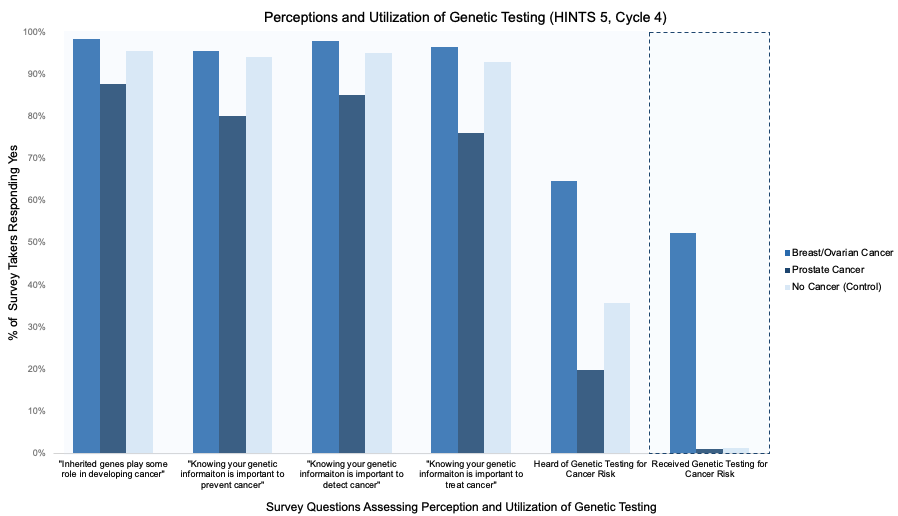Back
Poster, Podium & Video Sessions
Podium
PD13: Prostate Cancer: Epidemiology & Natural History II
PD13-03: Lack of awareness and underutilization of genetic testing in prostate cancer
Friday, May 13, 2022
3:50 PM – 4:00 PM
Location: Room 252
Sameer Thakker*, Stacy Loeb, New York, NY, Veda Giri, Philadelphia, PA, Richard Matulewicz, New York, NY

Sameer Thakker
NYU Grossman School of Medicine
Podium Presenter(s)
Introduction: Germline genetic factors are playing an increasingly important role in the management of many cancers, including breast, ovarian and prostate cancer. Additionally, germline test results may influence screening protocols for other cancers and have important implications for family members. However, public awareness and uptake of genetic testing among these different cancers is unknown.
Methods: We examined data from the HINTS 5, Cycle 4, collected from February to June 2020 on genetic knowledge, awareness and uptake of genetic testing, as well as sources of information on genetic testing. These survey data are collected in a two-stage random sample to generate a nationally-representative estimate of adults living in the U.S. We specifically compared patients with prostate cancer (n=61, weighted sample=1,542,420) to those with breast/ovarian cancer (n=97, weighted sample=3,741,402 ), and a comparison group with no history of cancer (n=3168, weighted sample= 226,434,648).
Results: Men with prostate cancer were significantly less likely to be aware of genetic testing for cancer risk (p=0.01). Compared to patients with breast/ovarian cancer and with no cancer, fewer men with prostate cancer responded that knowing genes are at least a little important to prevent, detect and treat cancer. Only 1% of men with prostate cancer underwent genetic testing for hereditary cancer risk and 0.8% had multiple forms of genetic testing, which was significantly lower than uptake among patients with breast/ovarian cancer (p < 0.001). Healthcare professionals were the most common sources of information about genetic testing for patients with breast/ovarian cancer; whereas, the internet and social media were the most common sources of information on genetic testing for patients with prostate cancer and those without a history of cancer.
Conclusions: Our results corroborate a lack of awareness and substantial underutilization of genetic testing among men with prostate cancer. These findings are concerning given the importance of germline genetic information for prostate cancer care and hereditary cancer risk. The internet and social media represent promising avenues to disseminate information about genetic testing in prostate cancer.
Source of Funding: Dr. Loeb and Dr. Giri are supported by the Prostate Cancer Foundation and Department of Defense

Methods: We examined data from the HINTS 5, Cycle 4, collected from February to June 2020 on genetic knowledge, awareness and uptake of genetic testing, as well as sources of information on genetic testing. These survey data are collected in a two-stage random sample to generate a nationally-representative estimate of adults living in the U.S. We specifically compared patients with prostate cancer (n=61, weighted sample=1,542,420) to those with breast/ovarian cancer (n=97, weighted sample=3,741,402 ), and a comparison group with no history of cancer (n=3168, weighted sample= 226,434,648).
Results: Men with prostate cancer were significantly less likely to be aware of genetic testing for cancer risk (p=0.01). Compared to patients with breast/ovarian cancer and with no cancer, fewer men with prostate cancer responded that knowing genes are at least a little important to prevent, detect and treat cancer. Only 1% of men with prostate cancer underwent genetic testing for hereditary cancer risk and 0.8% had multiple forms of genetic testing, which was significantly lower than uptake among patients with breast/ovarian cancer (p < 0.001). Healthcare professionals were the most common sources of information about genetic testing for patients with breast/ovarian cancer; whereas, the internet and social media were the most common sources of information on genetic testing for patients with prostate cancer and those without a history of cancer.
Conclusions: Our results corroborate a lack of awareness and substantial underutilization of genetic testing among men with prostate cancer. These findings are concerning given the importance of germline genetic information for prostate cancer care and hereditary cancer risk. The internet and social media represent promising avenues to disseminate information about genetic testing in prostate cancer.
Source of Funding: Dr. Loeb and Dr. Giri are supported by the Prostate Cancer Foundation and Department of Defense


.jpg)
.jpg)